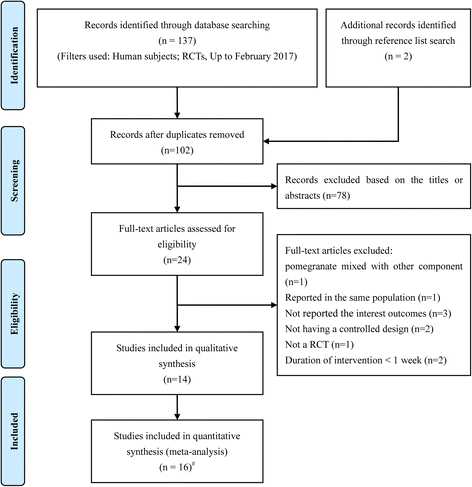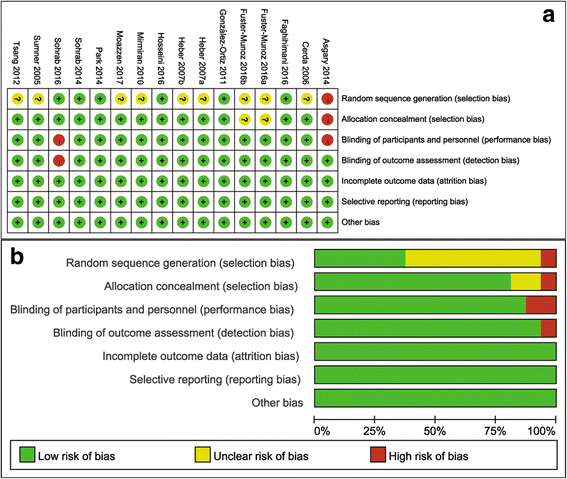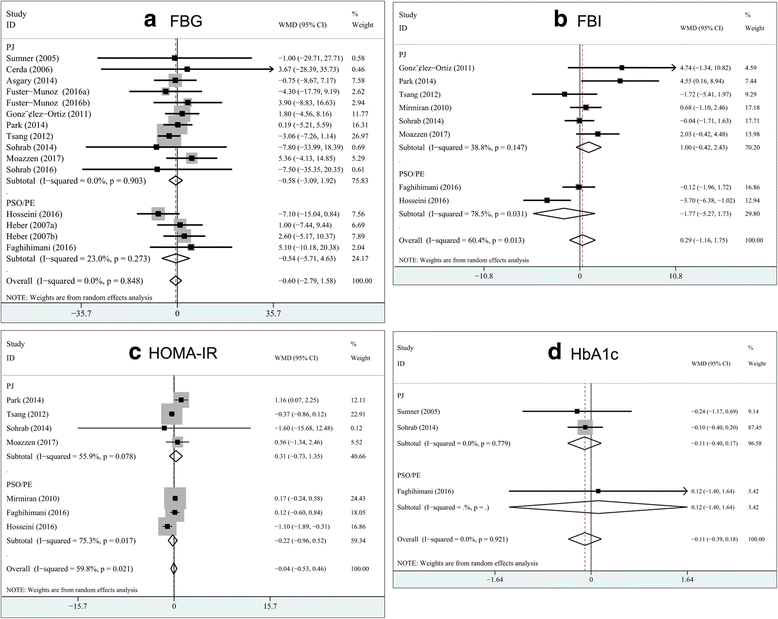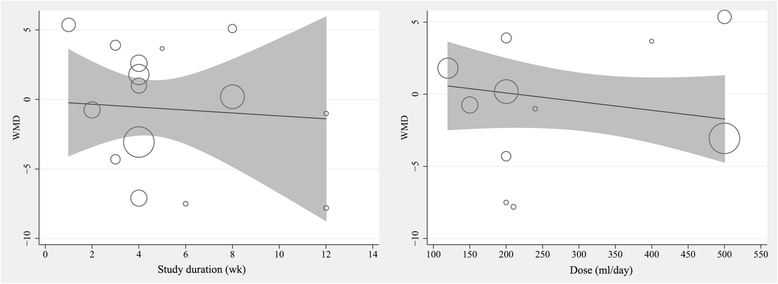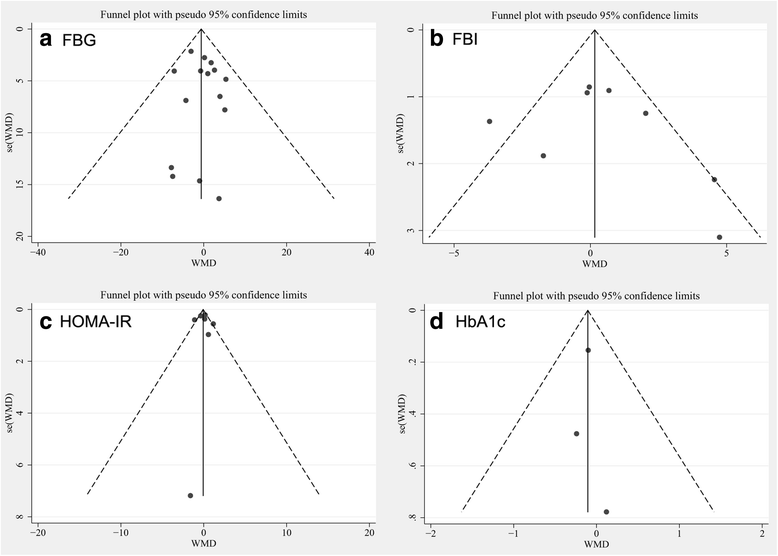Lack of efficacy of pomegranate supplementation for glucose management, insulin levels and sensitivity: evidence from a systematic review and meta-analysis - PubMed (original) (raw)
Review
Lack of efficacy of pomegranate supplementation for glucose management, insulin levels and sensitivity: evidence from a systematic review and meta-analysis
Haohai Huang et al. Nutr J. 2017.
Abstract
Background: The potential glucose-lowering effects of pomegranate have been reported in animal and observational studies, but intervention studies in humans have generated mixed results. In this paper, we aimed to conduct a systematic review and meta-analysis of randomized controlled trials (RCTs) to evaluate the precise effects of pomegranate supplementation on measures of glucose control, insulin levels and insulin sensitivity in humans.
Methods: Comprehensive electronic searches were conducted in PubMed, Embase, and the Cochrane Library. Studies included were RCTs that evaluated the changes in diabetes biomarkers among adults (≥18 years) following pomegranate interventions. The predefined outcomes included fasting blood glucose (FBG), fasting blood insulin (FBI), glycated haemoglobin (HbA1c), and homeostatic model assessment of insulin resistance (HOMA-IR). Endpoints were calculated as weighted mean differences (WMDs) with 95% confidence intervals (CIs) by using a random-effects model. Publication bias, subgroup analyses, sensitivity analysis and random-effects meta-regression were also performed to explore the influence of covariates on the net changes in fasting glucose and insulin concentrations.
Results: Sixteen eligible trials with 538 subjects were included. The pooled estimates suggested that pomegranate did not significantly affect the measures of FBG (WMD, -0.6 mg/dL; 95% CI, -2.79 to 1.58; P=0.59), FBI (WMD, 0.29 μIU/mL; 95% CI, -1.16 to 1.75; P=0.70), HOMA-IR (WMD, -0.04; 95% CI, -0.53 to 0.46; P=0.88) or HbA1c (WMD, -0.11%; 95% CI, -0.39 to -0.18; P=0.46). Overall, significant heterogeneity was detected for FBI and HOMA-IR, but subgroup analysis could not identify factors significantly influencing these parameters. These results were robust in sensitivity analysis, and no significant publication bias was found in the current meta-analysis.
Conclusion: Pomegranate intake did not show a notably favourable effect on improvements in glucose and insulin metabolism. The current evidence suggests that daily pomegranate supplementation is not recommended as a potential therapeutic strategy in glycemic management. Further large-scale RCTs with longer duration are required to confirm these results.
Keywords: Diabetes mellitus; Glucose; Insulin; Meta-analysis; Pomegranate.
Conflict of interest statement
Ethics approval and consent to participate
Not applicable.
Consent for publication
Not applicable.
Competing interests
The authors declare that they have no competing interests.
Publisher’s Note
Springer Nature remains neutral with regard to jurisdictional claims in published maps and institutional affiliations.
Figures
Fig. 1
Flow chart of data base searches and articles included in the present meta-analysis. # The work conducted by Heber et al. was separated into 2 trials; The study conducted by Fuster-Munoz et al. was also separated into 2 trials
Fig. 2
Results of risk of bias assessment. a Risk of bias graph: review authors’ judgments about each risk of bias item presented as percentages across all included studies. b Risk of bias summary: review authors’ judgments about each risk of bias item for each included study
Fig. 3
Pooled estimated effect of pomegranate on glucose control and insulin sensitivity as compared with the control arms. a fasting blood glucose; b fasting blood insulin, c homeostatic model assessment of insulin resistance; d glycated hemoglobin. WMD, weighted mean difference; PJ, pomegranate juice; PSO, pomegranate seed oil; PE, pomegranate extract
Fig. 4
Meta-regression result of the association between mean changes in fasting glucose concentrations with dose and duration of supplementation with pomegranate juice
Fig. 5
Tests for publication bias of impact of pomegranate consumption on glucose control and insulin sensitivity. a FBG, fasting blood glucose; b FBI, fasting blood insulin; c HOMA-IR, homeostatic model assessment of insulin resistance; d HbA1C, glycated hemoglobin
Similar articles
- Effects of l-arginine supplementation on glycemic profile: Evidence from a systematic review and meta-analysis of clinical trials.
Yousefi Rad E, Nazarian B, Saboori S, Falahi E, Hekmatdoost A. Yousefi Rad E, et al. J Integr Med. 2020 Jul;18(4):284-291. doi: 10.1016/j.joim.2020.05.001. Epub 2020 May 28. J Integr Med. 2020. PMID: 32561357 Review. - The effects of pomegranate consumption on glycemic indices in adults: A systematic review and meta-analysis.
Bahari H, Ashtary-Larky D, Goudarzi K, Mirmohammadali SN, Asbaghi O, Hosseini Kolbadi KS, Naderian M, Hosseini A. Bahari H, et al. Diabetes Metab Syndr. 2024 Jan;18(1):102940. doi: 10.1016/j.dsx.2024.102940. Epub 2024 Jan 3. Diabetes Metab Syndr. 2024. PMID: 38194826 Review. - Folic Acid Supplementation Improves Glycemic Control for Diabetes Prevention and Management: A Systematic Review and Dose-Response Meta-Analysis of Randomized Controlled Trials.
Asbaghi O, Ashtary-Larky D, Bagheri R, Moosavian SP, Olyaei HP, Nazarian B, Rezaei Kelishadi M, Wong A, Candow DG, Dutheil F, Suzuki K, Alavi Naeini A. Asbaghi O, et al. Nutrients. 2021 Jul 9;13(7):2355. doi: 10.3390/nu13072355. Nutrients. 2021. PMID: 34371867 Free PMC article. - Effects of oligosaccharides on the markers of glycemic control: a systematic review and meta-analysis of randomized controlled trials.
An R, Zong A, Chen S, Xu R, Zhang R, Jiang W, Liu L, Du F, Zhang H, Xu T. An R, et al. Food Funct. 2022 Aug 30;13(17):8766-8782. doi: 10.1039/d1fo03204f. Food Funct. 2022. PMID: 35946428 Review.
Cited by
- Pharmacotherapeutic potential of pomegranate in age-related neurological disorders.
Emami Kazemabad MJ, Asgari Toni S, Tizro N, Dadkhah PA, Amani H, Akhavan Rezayat S, Sheikh Z, Mohammadi M, Alijanzadeh D, Alimohammadi F, Shahrokhi M, Erabi G, Noroozi M, Karimi MA, Honari S, Deravi N. Emami Kazemabad MJ, et al. Front Aging Neurosci. 2022 Sep 1;14:955735. doi: 10.3389/fnagi.2022.955735. eCollection 2022. Front Aging Neurosci. 2022. PMID: 36118710 Free PMC article. Review. - Pomegranate peel anthocyanins prevent diet-induced obesity and insulin resistance in association with modulation of the gut microbiota in mice.
Song H, Shen X, Deng R, Chu Q, Zheng X. Song H, et al. Eur J Nutr. 2022 Jun;61(4):1837-1847. doi: 10.1007/s00394-021-02771-1. Epub 2022 Jan 18. Eur J Nutr. 2022. PMID: 35039918 - Ellagic Acid as a Tool to Limit the Diabetes Burden: Updated Evidence.
Amor AJ, Gómez-Guerrero C, Ortega E, Sala-Vila A, Lázaro I. Amor AJ, et al. Antioxidants (Basel). 2020 Dec 3;9(12):1226. doi: 10.3390/antiox9121226. Antioxidants (Basel). 2020. PMID: 33287432 Free PMC article. Review. - Effects of Polyphenols on Insulin Resistance.
Williamson G, Sheedy K. Williamson G, et al. Nutrients. 2020 Oct 14;12(10):3135. doi: 10.3390/nu12103135. Nutrients. 2020. PMID: 33066504 Free PMC article. Review. - Therapeutic Potential of Pomegranate in Metabolic Disorders.
Akaberi M, Boghrati Z, Sahebkar A, Emami SA. Akaberi M, et al. Adv Exp Med Biol. 2021;1328:421-440. doi: 10.1007/978-3-030-73234-9_28. Adv Exp Med Biol. 2021. PMID: 34981494 Review.
References
- Gerstein HC, Santaguida P, Raina P, Morrison KM, Balion C, Hunt D, Yazdi H, Booker L. Annual incidence and relative risk of diabetes in people with various categories of dysglycemia: a systematic overview and meta-analysis of prospective studies. Diabetes Res Clin Pract. 2007;78:305–312. doi: 10.1016/j.diabres.2007.05.004. - DOI - PubMed
Publication types
MeSH terms
Substances
LinkOut - more resources
Full Text Sources
Other Literature Sources
Medical
